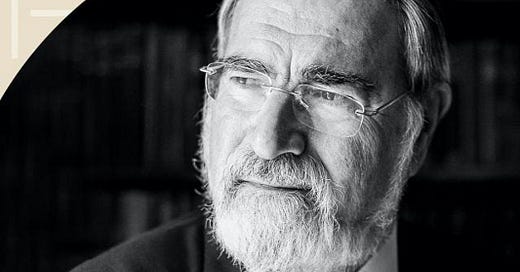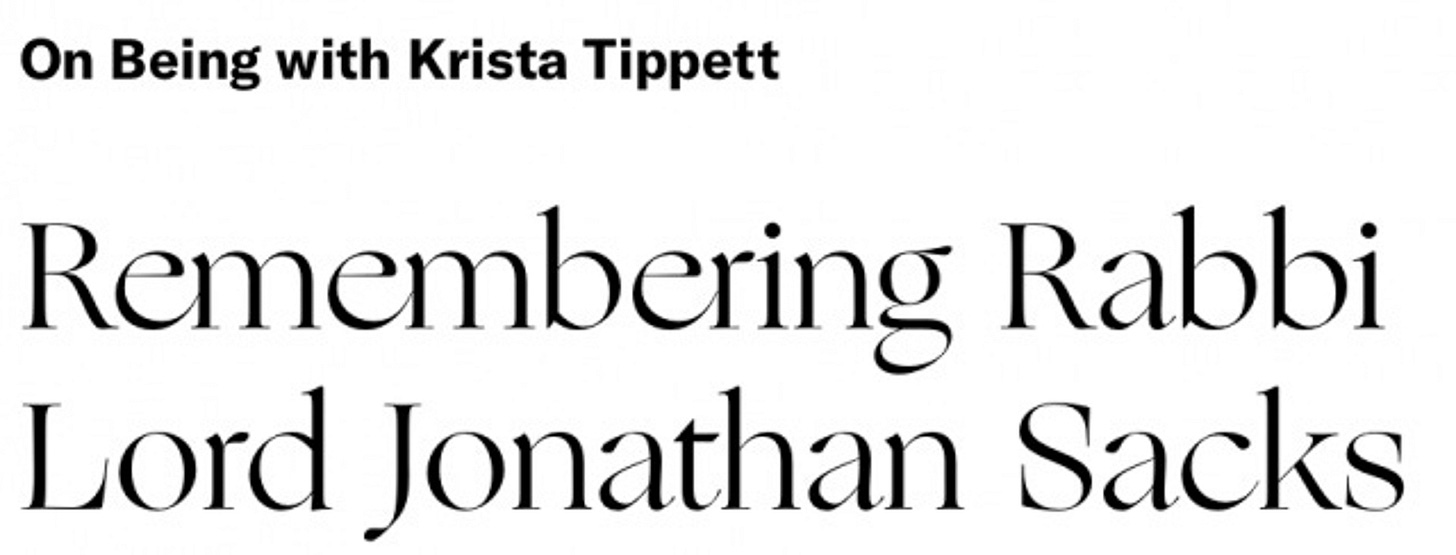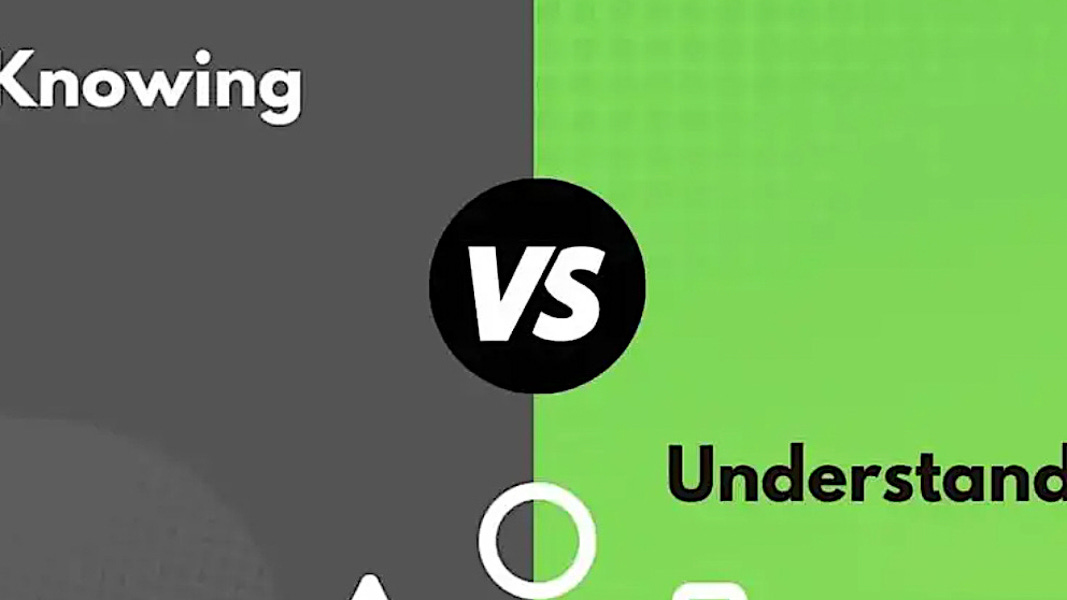[Best of] Week 23.28 Unity Creates Diversity
This past week I, together with co-authors Jacquelyn Lane and Marshall Goldsmith recorded the audiobook for Becoming Coachable, our book to be released on September 19. As we read the book, I reflected back on the path that led us to this moment and the future that we envision for our work. And it reminded me of the many giants who have influenced me and us. I was reminded of the late Rabbi Lord Jonathan Sacks died in November 2020 at the age of 72. I had the privilege of hearing the Rabbi on more than a few occasions and found him mesmerizing due to his profound intelligence, insights, wit, and ease of being. Rabbi Sacks always knew who he was, where he was, and who he was with. Profoundly religious, he connected across the faiths writing in 2002, "God has spoken to mankind in many languages: through Judaism to the Jews, Christianity to Christians, Islam to Muslims. ... God is the god of all humanity, but no single faith is or should be the faith of all humanity." (The Dignity of Difference)
His TED talk in 2017 is called How We Can Face the Future Without Fear, Together in which he asks the question, "Is there something we can do, each of us, to be able to face the future without fear?" and gives us three specific ways we can move from the politics of "me" to the politics of "all of us, together." ...when we move from the politics of me to the politics of all of us together, we rediscover those beautiful, counterintuitive truths: that a nation is strong when it cares for the weak, that it becomes rich when it cares for the poor, it becomes invulnerable when it cares about the vulnerable. That is what makes great nations. So here is my simple suggestion... do a search and replace operation on the text of your mind, and wherever you encounter the word "self," substitute the word "other." So instead of self-help, other-help; instead of self-esteem, other-esteem. And if you do that, you will begin to feel the power of what, for me is one of the most moving sentences in all of religious literature. "Though I walk through the valley of the shadow of death, I will fear no evil, for you are with me." We can face any future without fear so long as we know we will not face it alone. So for the sake of the future "you," together let us strengthen the future "us."
Krista Tippit in her On Being Podcast spoke of Rabbi Lord Sacks as modeled a life-giving, imagination-opening faithfulness to what some might see as contradictory callings: How to be true to one’s own convictions while also honoring the sacred and civilizational calling to shared life" In the podcast he says "Unity creates diversity. So don’t think of one God, one truth, one way. Think of one God creating this extraordinary number of ways, the 6,800 languages that are actually spoken. Don’t think there’s only one language within which we can speak to God... One of the ways God surprises us is by letting a Jew or a Christian discover the trace of God’s presence in a Buddhist monk or a Sikh tradition of hospitality or the graciousness of Hindu life."
Sacks' final book, Morality: Restoring The Common Good In Divided Times, was published just as the coronavirus pandemic was breaking out around the world. Though written before COVID-19 emerged, the book proved prescient, with its emphasis on the importance of "Living The We" rather than "Living the I." Rabbi Sacks died too young and his words of finding unity in diversity are still spoken by too few.
I am honored to be collaborating with so many of the members of the 100 Coaches who, with our work, honor Rabbi Sacks' legacy. If you are not familiar with his teachings, take the time to explore them. If you know them, make it a point to practice them. Reach out to someone that is not like you. It's the people not like us that make us grow. May his memory be a blessing.
How CEOs Can Help New CHROs Succeed by Hein J.M. Knaapen, CEO WORKS
You hired a Chief Human Resources Officer because you believe people are key to your company's ability to perform for all its stakeholders. So what do you expect of your CHRO—and what should you do to help them? Obviously, you didn't hire them to deal with mundane administrative tasks. Of course, they must take care of many operational matters and ensure the company abides by relevant employment laws and regulations. The truth of the matter is you hired them to do everything they can to enhance the capability of your company's management to drive value creation. That reason will not necessarily be intuitive to a brand new CHRO, especially if they have risen through the ranks of HR. They may very well be assuming you want them to deal with the entire menu of "people issues." In my experience, that assumption, in and of itself, can quickly overwhelm them. You can help by first, providing a clear line of sight from the company's value agenda to the selective people priorities that support value creation and, second, by helping them navigate the C-suite.
Give your new CHRO clarity about where to focus and what to deliver. Invite them to realize their full potential, to boldly rise to the challenge of the CHRO role, and match the greatness of their team members, for they are the one person, of all the people in your business (besides yourself), best qualified to look after the challenges and demands that come with working with people.
How important is understanding vs. knowledge? by Dr. Mark Goulston
Knowledge refers to the accumulation of facts and information about the world. It is essentially what we know. This includes specific details, facts, descriptions, and skills. From a school perspective, these might be dates, definitions, key concepts, procedures, formulas, and so on. Understanding, on the other hand, is more about grasping the meaning, translation, interpolation, and interpretation of the knowledge. It's about perceiving the underlying principles, making connections between different pieces of information, and being able to manipulate and apply that information in new, unfamiliar contexts. In essence, it is a deep comprehension of a topic or field. Understanding is important because it allows for flexibility and creativity in thinking. It also fosters problem-solving abilities and critical thinking skills, which are invaluable in navigating a rapidly changing world. However, understanding cannot exist without a base level of knowledge. You must have information to interpret and principles to apply. Therefore, knowledge and understanding are intertwined in the learning process.
Capacity for understanding is not fixed. With access to quality education, supportive environments, and plenty of opportunities to learn and grow, all young people have the potential to develop a deep and nuanced understanding of the world around them.
Embracing Your Wonderhell with Laura Gassner Otting by Tiffani Bova
In a moment of success, you think how incredible the experience was. It’s exciting, it’s humbling, it’s wonderful. But at the same time, you’re peeking through the doors to see what’s on the other side. There could be things you didn't even know were possible for you. It's anxiety-provoking, it's identity shifting, it's stressful, it's exhausting. So this moment is wonderful, but it's also hell. It's wonderhell.
Once you start achieving some success, that's when things get really hard because you actually care. It's really easy to not worry about the stakes of somebody else's success. You can't be insatiably hungry about someone else's goals, but when it's yours, that's when it gets real. Just remember that when the tsunami of emotions comes at you after success, it's not about surviving it or getting through it. Because it turns out that on the other side of this wonderhell is just the next one and the next one (and if you're lucky, the next one after that).
With love, gratitude and wonder. Scott













